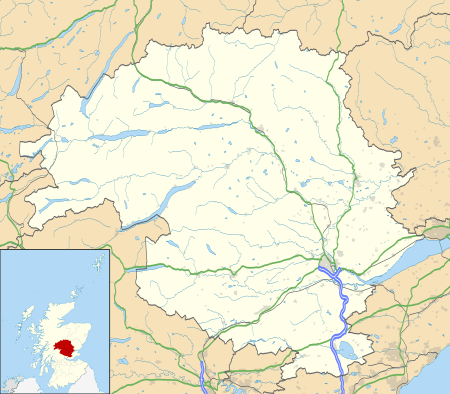Blackford, Perth and Kinross
Blackford (Scottish Gaelic: Srath Gaoithe)[1] is located in Perth and Kinross, Scotland, approximately 5 miles (8 kilometres) from the town of Auchterarder. The village is located just off the A9 between Perth and Stirling which has been bypassed since 1978. It is home to Highland Spring water and the Tullibardine whisky distillery.
Blackford
| |
|---|---|
 Blackford | |
 Blackford Location within Perth and Kinross | |
| OS grid reference | NN896089 |
| Council area | |
| Lieutenancy area | |
| Country | Scotland |
| Sovereign state | United Kingdom |
| Post town | Auchterarder |
| Postcode district | PH4 |
| Police | Scotland |
| Fire | Scottish |
| Ambulance | Scottish |
| UK Parliament | |
| Scottish Parliament | |
History
Blackford was first known as a ford over the Allan Water. There is a legend that a King Magnus lost his wife Queen Helen in a storm and she is buried on a nearby hill.
Blackford became a popular stopping place especially when Scotland's first public brewery was started. James VII of Scotland even stopped in Blackford while travelling to sample their ale.
The village was becoming more prosperous by the nineteenth century with manufacturing including two breweries and with a healthy agricultural sector based on wool and flax. The Scottish Central Railway built a line between Perth and Stirling with a station at Blackford in 1848.
Local manufacturing declined at the beginning of the 20th century with many people leaving the village. However, many people in the village were employed when the Gleneagles Hotel was opened nearby in 1924. The Tullibardine distillery was built on the site of the former Sharp's Brewery.
Carsebreck, near Blackford hosted 25 Grand Matches in curling, between 1853-1935. "A piece of ground which could be flooded for the purpose of affording a safe sheet of ice" was leased from Mrs Home Drummond Stirling Moray of Abercairney, at a rental of £15 for 63 acres (25 hectares) from November to February each season. The final match, on 24 December 1935, attracted 2,576 competitors.
Highland Games
The Blackford Highland Games began in 1870, when its prize money was ten shillings.[2] In 2020, on what was due to be the 150th anniversary of the competition, only one competitor took part due to the COVID-19 pandemic. 20-year-old Alisa Sloan won the Highland dancing competition by default.[2]
References
- Iain Mac an Tàilleir. "Placenames" (PDF). Scottish Parliament. Retrieved 19 August 2012.
- The Courier, 2 June, 2020